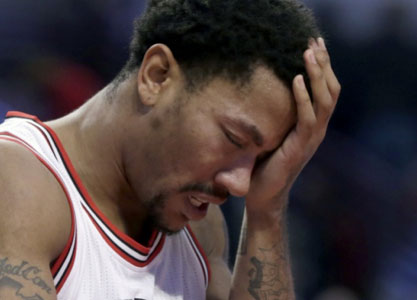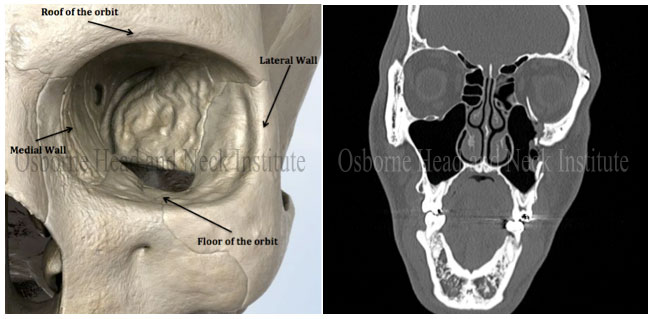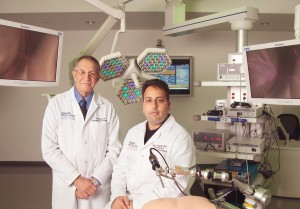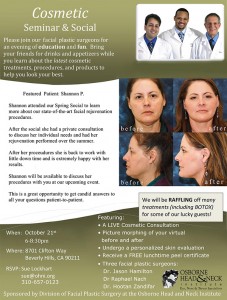- Folded Ear in Newborns: Treatment Options - April 11, 2018
- Newborn Ear Deformity: What Can Be Done? - April 11, 2018
- Ear Molding: An Overview - November 2, 2017
- Otoplasty for Protruding Ears - September 26, 2017
- Basal Cell Carcinoma: Facial Reconstruction Timing - September 26, 2017
- Clinical Considerations of Mohs Reconstruction of Cheek Defect - September 26, 2017
- Basal Cell Carcinoma: Nasal Bridge Reconstruction - September 26, 2017
- Skin Cancers Involving the Eyebrow: Clinical Considerations - October 3, 2016
- Treatment of Multiple Skin Cancer Lesions - June 1, 2016
- Skin Cancer: Nasal Reconstruction and Scar Management - June 1, 2016
CHICAGO – Bulls point guard Derrick Rose suffered a left orbital fracture during practice after taking an elbow to the face. He was taken to Rush University Medical Center for a medical evaluation. Team coach, Fred Hoiberg, stated on Wednesday, September 30th that Derrick Rose underwent a successful surgery to repair the orbital fracture. Team officials state that he is expected to be able to resume “basketball activities” in 2 weeks.

Condition Background
Orbital fractures occur when one or more bones that form the eye socket have fractured. Orbital fracture injuries are relatively common in the setting of facial trauma during sporting activities. Due to the amount of swelling associated with these injuries, many people do not initially realize that they have sustained an orbital fracture. Swelling of the surrounding tissues can mask the appearance of a sunken eye as well as other tell-tale signs (double vision, pain with eye movement, etc.). Typically, when swelling subsides in the following days, changes in the shape of the eye socket and surrounding face become more evident. Facial trauma including any suspected eye injuries should be promptly evaluated by a facial trauma specialist to rule out an orbital blow out fracture and preserve the function of critical structures associated with the eye.

Evaluation of suspected blow out fractures include a comprehensive physical exam of the injured area. The gold standard for facial trauma evaluation includes a computerized tomography scan (CT Scan). A CT Scan allows the physician to detect any underlying injuries that are not readily apparent. In addition, the physician able to ascertain the extent of the fracture, damage to the structures associated with the eye (nerves and muscles), and the integrity of adjacent structures (brain, sinus, etc). Based on the facial trauma specialist’s evaluation, a custom treatment plan can be constructed to optimize healing and decrease the possibility of avoidable complications.
Treatment of an orbital fracture is largely based on the extent of the trauma and the resulting injury.
Minor Injury
Minor orbital fractures that are determined to not have appreciable bone fragment displacement, changes in vision, or pain with eye movement are typically treated with conservative measures. Surrounding critical structures are determined to be largely uninvolved in these injuries. These patients are observed during healing and asked to avoid any physical activities that can aggravate the existing injury.
Moderate Injury
Moderate cases of orbital fracture in which the bones of the orbit have moved from their original locations require meticulous realignment and fixation of bone fragments. Treatment in these cases is accomplished through inconspicuous incisions placed under the eyelashes, the interior of the eyelid, or through the nasal sinus. If left untreated, bone fragments can damage critical structures including the eye, brain, muscles of the eye, and surrounding vasculature.
All cases of suspected orbital fracture should be promptly evaluated by a qualified facial trauma specialist. These physicians can determine the extent of the injury and recommend an appropriate treatment plan that optimizes healing time and promotes a desirable outcome. If left untreated, an orbital fracture can lead to unwanted functional and cosmetic complications that will require more extensive interventions at a later time.
To learn more about Dr. Hootan Zandifar or treatment of orbital fractures, please visit: www.facialtraumamd.com.
Sports Injuries
- Oklahoma City Thunder guard Russel Westbrook suffers a cheekbone fracture.
- Miami Heat player LeBron James suffers a nasal fracture.
- Atlanta Hawks guard Kyle Korver suffers a nasal fracture.
- New York Jets quarterback Geno Smith suffers a broken jaw.



